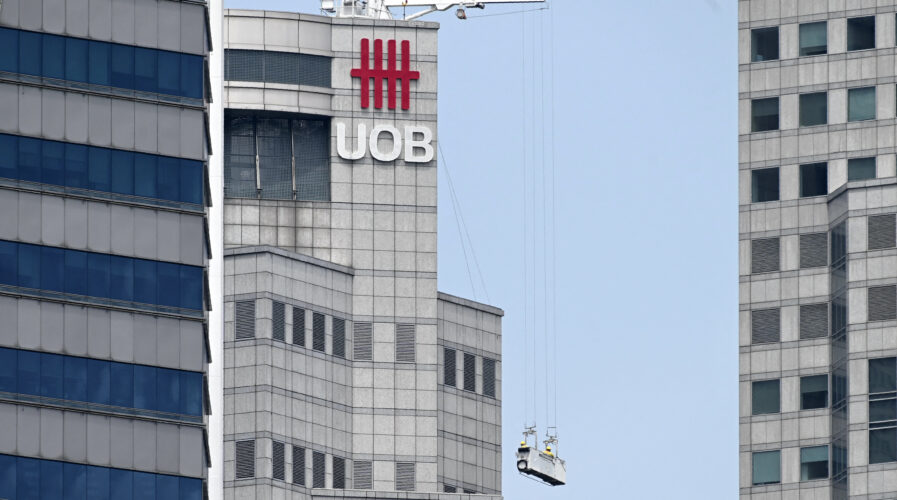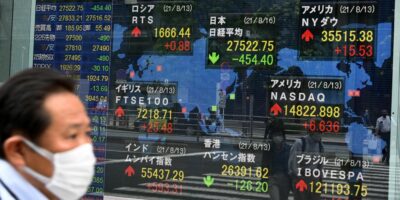
UOB Malaysia launched U-Energy to spur uptake of greener choices by businesses and homeowners. (Photo by Roslan RAHMAN / AFP)
UOB targets Malaysia with U-Energy, Asia’s first integrated financing platform
UOB Malaysia launched U-Energy, the first integrated financing platform in Asia, last week. The bank aims to promote the country’s adoption and development of energy efficiency projects for buildings and apartments.
According to UOB, U-Energy will help local businesses and homeowners save on electricity bills, achieve sustainability goals, and lower carbon emissions, following its initial roll-out in Singapore.
Development of UOB’s U-Energy
U-Energy was developed to assist owners keen on taking up energy projects but lack financial support and expertise in finding the right ESCO (energy service companies).
The U-Energy platform features ten ESCOs that play a vital role in providing a technology and services ecosystem.
Customers can tap into these energy efficiency projects via these ESCO, through services such as project consulting, energy audits of sustainable and economic planning, and implementation and comprehensive management of building renovations.
“For businesses and homeowners, implementing energy-efficiency projects on their premises may take up substantial amounts of time, investment, and resources.
“With its end-to-end solutions, U-Energy makes it easy for our customers to access services to save energy costs and reduce their carbon footprint,” said Ng Wei Wei, Deputy Chief Executive Officer, UOB Malaysia, at the virtual launch.
The potential of energy efficiency financing in ASEAN
“The potential for energy efficiency financing opportunities in ASEAN between 2020 and 2030 is estimated at US$139 billion,” added Ng.
On average, the ESCOs on the U-Energy platform would help customers cut at least 20 per cent in energy consumption.
“There is an annual economic opportunity estimated at US$1 trillion to be tapped by 2030 in Southeast Asia. Similarly, UOB group aims to build a sustainable finance portfolio of SGD25 billion by 2025,” she said.
These U-Energy partners can support joint energy efficiency projects, such as improving air conditioning efficiency, installing solar panels on roofs, converting to LED lights, optimizing energy and energy management systems, and replacing elevators with energy recovery technology.
Malaysia’s commitment to lowering GHGs
As a signatory to the Paris Agreement, Malaysia has committed to reducing GHGs (greenhouse gases) by 45% by 2030.
Of these, 35% are unconditional, whereas the remaining 10% are dependent on additional climate financing, technology transfers, and capacity-building measures from developed countries.
Only 8% of the Southeast Asian nation’s energy generation is from Renewable Energy (RE).
Malaysia has recently introduced multiple initiatives supporting RE uptake, including feed-in-tariffs (FIT), net energy metering (NEM), large-scale solar (LSS), and self-consumption (SELCO).
Financial incentives of going green in Malaysia
Businesses can apply for the SRI Sukuk and Bond Grant Scheme under the Security Commission’s (SC) Sustainable and Responsible Investment (SRI) Sukuk Framework or bonds.
Eligible issuers can claim the grant to offset up to 90% of the external review costs incurred, subject to a maximum of RM300,000 per issuance.
As announced in the country’s Budget 2021, income tax exemptions are given to SRI Sukuk and Bond Grant Scheme recipients for five years, up to 2025.
U-Energy is also supported by government agencies such as the Sustainable Energy Development Authority (SEDA) Malaysia, Malaysian Investment Development Authority and Malaysian Green Technology Corporation.
READ MORE
- The criticality of endpoint management in cybersecurity and operations
- Ethical AI: The renewed importance of safeguarding data and customer privacy in Generative AI applications
- How Japan balances AI-driven opportunities with cybersecurity needs
- Deploying SASE: Benchmarking your approach
- Insurance everywhere all at once: the digital transformation of the APAC insurance industry


